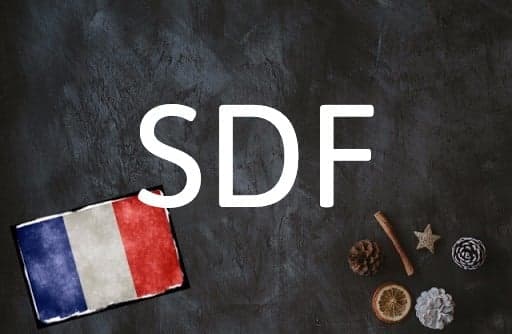French Word of the Day: SDF

There are about 300,000 SDF in France - which is why it is an important set of initials to know.
Why do I need to know SDF?
Because anyone could be unlucky enough to end up in this situation.
What does it mean?
SDF, pronounced ess-day-eff, stands for sans domicile fixe - without a fixed address. The shortened version is not just used in official reports, it's widely used in everyday speech and news reports.
SDF used to describe homeless people, but isn't limited to those sleeping on the street.
Anyone without a permanent home, including those staying in emergency housing or hostels for example, is included in the SDF category.
Someone living on the street is known as a sans-abri - without shelter.
READ ALSO: SIDA to RIB - the everyday French initials and acronyms to know
Charities say that around 300,000 people fall into the SDF category in France but a lack of official surveys means calculating the number of sans-abris is harder.
One count conducted in January 2022 estimated that there were at least 2,600 sans-abris living in Paris alone. One organisation claims the nationwide figure might be as high as 200,000.
Use it like this
83% des personnes SDF disent ressentir le rejet des passants - 83 percent of homeless people say they feel the rejection of passers-by
Les personnes sans-abri ne représentent qu'une partie des SDF - People without shelter only represent a part of those without a fixed address
Le nombre de SDF a doublé - The number of homeless people has doubled
Il est SDF - He is homeless
Synonyms
La population itinérant - The homeless population
Some people use the offensive terms mendiant or clochard to mean beggar. But one study found that up to a quarter of homeless people in France have some kind of employment.
Comments
See Also
Why do I need to know SDF?
Because anyone could be unlucky enough to end up in this situation.
What does it mean?
SDF, pronounced ess-day-eff, stands for sans domicile fixe - without a fixed address. The shortened version is not just used in official reports, it's widely used in everyday speech and news reports.
SDF used to describe homeless people, but isn't limited to those sleeping on the street.
Anyone without a permanent home, including those staying in emergency housing or hostels for example, is included in the SDF category.
Someone living on the street is known as a sans-abri - without shelter.
READ ALSO: SIDA to RIB - the everyday French initials and acronyms to know
Charities say that around 300,000 people fall into the SDF category in France but a lack of official surveys means calculating the number of sans-abris is harder.
One count conducted in January 2022 estimated that there were at least 2,600 sans-abris living in Paris alone. One organisation claims the nationwide figure might be as high as 200,000.
Use it like this
83% des personnes SDF disent ressentir le rejet des passants - 83 percent of homeless people say they feel the rejection of passers-by
Les personnes sans-abri ne représentent qu'une partie des SDF - People without shelter only represent a part of those without a fixed address
Le nombre de SDF a doublé - The number of homeless people has doubled
Il est SDF - He is homeless
Synonyms
La population itinérant - The homeless population
Some people use the offensive terms mendiant or clochard to mean beggar. But one study found that up to a quarter of homeless people in France have some kind of employment.
Join the conversation in our comments section below. Share your own views and experience and if you have a question or suggestion for our journalists then email us at [email protected].
Please keep comments civil, constructive and on topic – and make sure to read our terms of use before getting involved.
Please log in here to leave a comment.